435 U.S. Congresspeople and 100 Senators have a lot of power, enacting policies and making laws that affect our lives in more ways than many people realize. They influence the safety of our food and water, our economy and tax policies, the safety and fairness of our workplaces, the nature of our criminal justice system, our military budget, our environmental policies, and more. When Congresspeople behave foolishly, the consequences can be tragic. When they behave wisely, good things get done.
Representative Ro Khanna of California’s 17th District is both a thinker and a politician, someone whose policy chops are matched by his humanitarian values. In a world where it’s easy to become pessimistic at how the powerful operate, Khanna stands with integrity and stature for the things that matter most. I have long admired him, and enjoyed reading his recently published book Dignity in a Digital Age: Making Tech Work for All of Us.
Here is our TRANSFORM interview:
MW: Congressman Khanna, thank you so much for being with me today. I'm honored that you're here.
Congressman Khanna: I'm really honored to be here. Especially now as having written a book, having someone who has written four bestselling books, I have total admiration for it, a greater appreciation.
MW: Well, the admiration is mutual. Your book is called “Dignity in a Digital Age: Making Tech Work for All of Us.” You represent one of the wealthiest districts in the United States. You represent a district where there is this huge group of tech giants and conglomerates. Some of the wealthiest tech billionaires in the country live in your district. So you are very well aware of the tremendous growth opportunities and wealth creation that have been produced by technology.
But you're also well aware in all of the work that you do, and particularly in this book, of the damage that has been created in this country by the tech industry, both in terms of wealth inequality, the digital divide, and so forth. How so much of the technological power is concentrated in particular areas of the country, particularly urban areas. You lay all this out, and that's one of the things I like about you. You never pussyfoot around what the problems are, but in this book, as in all of your work, you also lay out the solutions. So what is the problem as you see it regarding the digital divide, regarding the damage that's been done in our society because of that, and what are the solutions as you see them?
Congressman Khanna: Well, Marianne, I think you laid it out in an excellent way. My district has $11 trillion of market cap. Tesla, Apple, Google, Intel, Yahoo, Cisco, LinkedIn, all there. Probably the most wealth ever created in one place in human history. Putting it in perspective, Russia's entire GDP is $1.6 trillion. The market cap of companies in my district are $11 trillion. And young people in my district are very optimistic about America in the future.
The challenge is that globalization and digitization have left a lot of people out. In rural communities, people often are concerned about declining church attendance, their kids wanting to buy one way tickets out. Deindustrialization. You have an increasing racial wealth gap, as these opportunities have not come to many black and brown communities. You have many workers, two-thirds of workers still do nothing with Zoom or tech or laptops. They do physical work. Two-thirds of those workers, many of them, their salaries haven't gone up, their benefits haven't gone up, their rights actually have diminished. So the book is about how do we create more dignity and opportunity in a modern economy, and how is that not just concentrated to a few who happen to be winners in my district.
MW: How do we do it?
Congressman Khanna: Well, I would argue three principal ways. First, we need to decentralize the jobs. We have to care about place and have place-based policy. It's not enough to tell people to move to the jobs. People don't want to move often. They want to stay with their family. They want to stay in their hometowns. We need to bring the job opportunities to them. 25 million digital jobs by 2025. That's more than manufacturing and construction combined. These pay twice the median average. We need to invest in land grant universities and HBCUs to partner with the private sector to create these jobs in communities across the country.
Second, we need to make sure that we have workers' rights in this digital economy. Workers should have the right to be on boards. They should have the right to unionize. They should be treated as employees. If you have the lottery of working for one of the trillion dollar companies, you shouldn't be worried about whether you'll make ends meet and can support a family, and you should have dignity in the workplace.
And three, we need to affirm our rights as citizens online. If we're going to expand the internet economy, we need to make sure that our right to our own data is considered inalienable, that people can't manipulate us, take our data to support causes that we may disagree with.
MW: One of the things I've heard you say is that a lot of these changes are beginning to happen. I suppose, in large part, just because of an appeal to patriotism. We must re-industrialize. We must create greater economic injustice in this country. Many of the people who have gained the most from a rigged system now realize that this has gone too far, and that for the sake of our democracy and all of our children's future, we must begin to right this ship. But is it happening fast enough? And what are the kind of legislative changes that you want to see happen that would actually incentivize these companies, incentivize both Congress and the private sector to make the kind of public-private partnerships that will make this happen and make it happen fast enough?
Congressman Khanna: It's not happening fast enough. In fact, people were very, very skeptical in my own district when I was talking about spreading out digital opportunity and jobs. When I was elected in 2016, people said, "It can't be done." Then COVID happened. There was a COVID realignment. People saw not every company or job needs to be in Silicon Valley. And a venture capitalist who read my book said, "Ro, my critique is that we're already doing all of this. What are you saying that's new?"
So they went from impossible to inevitable, and the truth is in between. We actually need policy that is place-based and focused on place. What would that entail? We should have massive investments in our land grant universities and our HBCUs to partner with the private sector, not necessarily to create four-year or two-year degrees, but to create certificates that pay people to get them and have a job at the end of it. Not training to nowhere that doesn't lead to a job, but actually paid programs that lead to jobs in communities where they don't have to move.
Second, we ought to create with our federal contracts, which are about $80 billion in technology, some requirement that a workforce have people from rural communities, that they have black and brown workers, that they have more gender diversity. That would help in creating more digital equality.
A third idea and then we can go on to a different topic. But a third idea that would really work is to have the government invest in pathbreaking technology in midsize cities across this country, so that we have more opportunity for these jobs. And the point, Marianne, is these jobs aren't coding jobs in Silicon Valley. That's one of the big myths. A lot of the jobs actually don't require much coding. They're manufacturing, retail, healthcare jobs. The point is if you want to have a computer on wheels, which is a modern car, I don't see why those jobs need to be in Silicon Valley as opposed to taking place in Michigan.
MW: Right. Well, even in the effort to re-industrialize - which I think more and more people realize that we must do - a lot of the jobs in an era of re-industrialization will include technology. So it's just part of the alphabet of our times, correct?
Congressman Khanna: Exactly.
MW: Before we get off that topic, how close are we to the makeup of a Congress that would even begin to pass the kind of agenda that you were just mentioning?
Congressman Khanna: Well, surprisingly and positively, we're on the verge of passing the COMPETES Act. It passed the Senate and passed the House. It's a step in the right direction. It would provide massive investments for semiconductor manufacturing in the United States. It will create some of these tech hubs across the United States. But it's just a start. We need to do this in a systematic way, in a big way, and this is a start towards that.
The reality is we ought to be talking about that a lot more. Donald Trump did the whole Carrier deal or Foxconn. The whole country thought he was fighting for the Midwest. Here, you actually have Intel putting $20 billion into Ohio, the president recognizing it in the State of the Union, and still, most Americans don't know that this is actually a great effort at economic revival. So we need to do a lot more of it and we need to actually tell the story a lot more.
MW: That has a lot to do with China though, doesn't it? Taiwan, the semiconductors, our need to start producing them here?
Congressman Khanna: It does. I mean, I certainly think that first of all, during the pandemic, people said, "Well, we're getting all these semiconductors from Taiwan and South Korea, and when things don't work well and the shipping costs are so high, our prices go up," and they realized that that's not smart national strategy. But also, why is it that we don't do the mass production in this country?
This is so important, Marianne, and it's a point that maybe is slightly academic, but it's, in my view, absolutely essential. That is, we didn't invent the automobile or the jet engine. We figured out the mass production of it. That's what made us a superpower, an economic superpower. The irony is we did invent the semiconductor, but we've let the mass production go elsewhere. Well, this country, we need to do more than the invention. I'm all for having as many Nobel laureates. I think that's wonderful. But we need to focus also on mass production and producing things here. That's what generates wealth. That's what generates good jobs. And we've had a policy, frankly, of neglect of that, thinking that the market unrestricted can just allow that mass production to go anywhere, and that was a flaw in our thinking.
MW: I think the movie that Michael Moore made several years ago, Where to Invade Next, really talked about that, about how America comes up with these great ideas and then other countries take them and actually effectuate them and operationalize them more and better than we do. And unfortunately, right now, that even includes our democracy.
So obviously, America has ended up on getting... Americans, anyway, not America as a whole, the vast majority of Americans have ended up getting the short end of the stick for all the reasons that you say, because we have put the economic bottom line and the short-term profit maximization for these huge corporate behemoths and the absolutism of property rights before democracy, before those humanists and humanitarian values that you mentioned in your book. Economists have been listened to more than humanists. The economy should serve people and not the other way around. That's what I love about you, because you stand for the principles and you stand for the policies that would right that ship.
I think the question that comes up for me, even with what you just said, you said a couple of times, "It's a start." I think the question at this point is that so many of the ideas, so many of the things that are happening that are good, it seems to me are things that should have happened 20 years ago. Or problems that should have never been allowed to occur at all. Clearly, right now, we need to come up with some fundamental changes and quickly, so we can leap right over some of the very dangerous, truly deadly consequences of our neglect of people and planet that have taken us to where we are.
I'd like to hear your thoughts about Ukraine. You're on the Armed Services Committee. Among other things, I want to talk about the nuclear issue. We've been told for years, a policy of Mutually Assured Destruction would mean we didn't have to worry about it. It's okay that we have 7,000 plus nuclear bombs. It's a good thing, see, because nobody will drop one because they know that they will be hit in return. Clearly, this week it's clear that only works if it's a rational actor you're dealing with. So really anything you want to talk about, including what you would do today if you were president. What are your thoughts about what's happening in Ukraine as a human being, obviously, and also as a member of the Armed Services Committee?
Congressman Khanna: Well, it's horrific. I mean, it's horrific to see Putin's invasion of a sovereign nation, to see his targeted bombing of civilians, and seeing these stories of fathers taking their families for rescue and then coming back to Ukraine to fight.
I was in Munich with Speaker Pelosi. We met with the Mayor of Kyiv. He's a 6' 7" boxer and he talked about the fight for his homeland. The question is what can we do to one, prevent human lives from being lost, to stand up for Ukraine and to bring some peace.
First, we need to recognize that our dependence on petrostates is an issue for democracy and national security. Why are we in a situation and why is Europe in a situation dependent on Russia, dependent on Saudi Arabia? Saudi Arabia's brutal war in Yemen. Dependent on Venezuela. This should be the time that the president says if ever there was a moment for a moonshot on renewable energy that is for democracy promotion, that is for standing up for freedom, it is now so that we don't give petrostates the leverage they have.
Second, I support the president with all of the sanctions with making sure we go after the oligarchs, seize their property, that we put pressure on the Russians. I support getting arms to the Ukrainians who are making this valiant fight, but there has to be an off ramp. There has to be an end game. And Zelensky today on ABC said that he's open to some dialogue. I think we need to have our best and brightest diplomats there, people like Richard Holbrooke, who are, while we're putting pressure on Putin, figuring out how we have some solution. Because the alternative to that is thousands of Ukrainians dying and Putin continuing to do incredible damage.
So that would be my recommendation. I have appreciated that the president hasn't responded tit for tat with Putin, that he hasn't endorsed the idea of a no-fly zone, which is basically a shooting war with Russia, that he hasn't escalated our nuclear posture. Look, Putin has a lot less to lose. We should be the responsible party standing up with Ukraine firmly, being in the moral clear, but trying to figure out how we provide off-ramps to end the conflict.
MW: I'd like to talk about the sanctions issue, if I might. I understand about sanctioning these oligarchs. Go for it. But I also understand, as I'm sure you do, Congressman, how difficult that is. How many loopholes these people have, how many ways to get out of any really serious damage we might do to them. Are you concerned that so much of the damage that this is doing to average Russians could actually work against us rather than for us? Especially since Putin is suppressing so much information so that they don't know, so many of them, what's really happening, although thousands of them do and are so courageously protesting. Are you concerned that the damage to the average Russian citizen's life that is being created by these sanctions might actually make them side more with Putin and think that we're the bad guys doing the damage to them that he is saying we're doing?
Congressman Khanna: That's always a danger of overly broad sanctions, but I think these sanctions, if presented correctly with the right type of messaging, that these are sanctions against Putin and his government, not against the Russian people. That our beef is not with the Russian people. We understand the Russian civilization. It's a great civilization. They gave the world Tolstoy, and Dostoevsky, and Chekhov, and a lot of wonderful contributions. We are not against the Russian people, we are against this government.
The sanctions are on the oil exports. The sanctions are on the banks that are hurting the ruble. And I do think the sanctions are hurting Putin because he still has an unreasonable offer on the table, but it's less unreasonable than what he was saying two weeks ago. So if the pressure is there, that may make negotiation more possible.
And it also sends a message, frankly, to a China or to any other country, that if they think of invading territorial sovereignty of another country, they're going to be a pariah economically from the world. I think that's an important message to send.
But so far, I think that you actually have seen the Russian people oppose what Putin's doing, because of the sanctions. I think it's delusional to think that this is going to effectuate some kind of regime change. I think when every time the United States has tried to do that, it has backfired. I don't think that should be the United States policy.
MW: No.
Congressman Khanna: I think our policy should be that this is a consequence for violating territorial sovereignty. We're going to continue to put pressure with our NATO allies, but we are always open to a dialogue to bring a peaceful resolution.
MW: Are you hopeful?
Congressman Khanna: It's hard to be hopeful right now when you see the bombing. I think some of the sense, yes. Your heart roots for the Ukrainian resistance and it's wonderful to see, but I also know it's public record that the strength of the Russian army and it ought not to be underestimated. Yeah, they have bad logistics, but they also have just a ton of fighters and Putin doesn't care. He's willing to be in place for a long time. So I don't think we should view this with rose-colored glasses.
What makes me hopeful is when Zelensky says, "Yes, we need to have dialogue. Yes, we need to figure out a solution here." I think that that is ultimately what will save human lives. That's what gives me some hope. But the longer this goes on, my concern is the absolute destruction of a nation and human lives. I don't think Russia will succeed in annexing Ukraine, but Russia may succeed in destroying Ukraine, and that's my concern.
MW: Exactly.
Do you think the United States has some reckoning to do? That we have to take a good strong look at our own foreign policy in relation to NATO over the last few decades, and how we encouraged Ukraine in its Western tendencies? First of all, I realize that the Ukrainians have their own agency and that they chose a Western direction. But in terms specifically of our policies with NATO, do you think the United States made some mistakes?
Congressman Khanna: Well, I think right now what's important is to support President Biden's clarity that this was Putin's invasion. If you read Putin's essay, he basically says that Ukraine should be part of Russia, and that that is his view of a united Russia and a united Soviet Union. So whatever one's view on NATO expansion, I don't think that is what precipitated Putin's invasion. I think Putin's invasion was precipitated by his view of having a one Russia policy, and it's morally wrong. The problem with that debate is Putin uses that as sort of a justification for his actions, which clearly isn't the case. When this-
MW: As do many on the left.
Congressman Khanna: When this crisis is past us, it's always important to examine American foreign policy and see what is the best course and where can we make the appropriate commitments and actually keep those commitments, but it should not be used in any way to obscure the moral clarity here. I think that this is important for the left to say Putin is the bad actor. He's unambiguously the bad actor here. He's the one who's bombing kids, and there's nothing that justifies that.
MW: I very much agree with you. There is no moral equivalence between what he's doing in Ukraine and mistakes that America made regarding NATO. I couldn't agree with you more.
I heard Matt Duss say NATO is part of it. It's just one factor out of many. And believe me, Congressman, I certainly agree with you about that.
What about nuclear power though? Nuclear arms. I'm concerned about the conversation that will emerge on the other side of this.
When I was a young person, we used to march down the street with Ban the Bomb protest signs, and now the nuclear arms race, the conversations around nonproliferation are never really about nonproliferation. They're make a little bit here and a little bit better there. I'm very concerned because I think that one sector of our society will actually use this crisis as an excuse to go further. I mean, there are people who talk almost casually with terms like “limited nuclear war.” Do you think that we have any chance of making this go in a completely opposite direction, of a real burst of enthusiasm for actual nonproliferation now that this country and people of the world have seen the danger of coming this close to somebody dropping one again?
Congressman Khanna: I do. I think it's a recognition that mutually assured destruction only works when you have rational actors with a lot of checks on them, and it doesn't work if those systems break down. I mean, when I think of a concern of Putin launching a nuclear weapon, which he keeps talking about, I'm hopeful that there are some checks of generals around him and that he can't just single-handedly make that decision. But the fact that it's a non-zero probability that he would use a nuclear weapon should send shivers down everyone's spines. I think it has, frankly, with the president and his national security team. That's why I think the president here has been responsible in trying to be de-escalatory and not engage in kind of a machoism of meeting Putin with equal aggression as some have urged him to do. I hope it'll also make it obvious that we ought to be engaged in negotiation with Russia to get back into some of the nuclear arms agreements that Gorbachev and Reagan negotiated that Republican presidents have gotten out of.
The irony is a world where there are not nuclear threats benefits America the most. Why? Because we have the most to lose. We have the most wealth. We have the most prosperity. We're leading the world in so many ways. There are other actors with far less to lose, who are more likely to have some leadership say, "Okay, we're just going to take our chances with a nuclear weapon." So we should be leading a world that is for nuclear nonproliferation, and hopefully that is a mantra.
MW: Well, I'm sure that you would agree with me, Congressman, that there's more to not wanting a nuclear holocaust and that we have so much to lose. It's that humanity has so much to lose. And we have to, on the other side of this, hopefully develop a plan for waging peace and not just ways to wage war.
The more we learn about the nuclear missile crisis in the 1960s with Khrushchev and Kennedy, the more we know now that it really wasn't so much Russia versus the United States as it was, in both camps, sane people versus insane people. There were people around Kennedy who were very reckless in their attitudes and there were people around Khrushchev who were very reckless. And there were people around Kennedy who said, "No, we really can't go there," and there were people around Khrushchev who said, "We really can't go there." We can only hope that there are some sane people around President Putin right now. And I assume that there are, one can only imagine what's going on behind some closed doors in Russia as in Washington as well.
Congressman Khanna: Yeah, and I think-
... the president has the benefit. I know Secretary Blinken, and I think he is prudent and rational and thoughtful, and I think that Biden's instincts are the same. I mean, look, Biden pulled out of Afghanistan because he understood that America shouldn't be committed to endless wars. He's been criticized by my Republican colleagues every day. Why has he said no ground troops in Ukraine? Why did he rule that out right off the bat? He was wise to rule that out right off the bat. So I think that the president is showing that leadership. I have no idea whether people around Putin are a check on him. I certainly hope, sure do hope that there's some people around there, generals and others, who get the calamity it would be. That the oligarchs there get what the calamity it would be.
MW: Well, I agree with you that the president's tenor has been appropriate. And I also appreciate the even hand. Clearly, he doesn't look at war, he certainly doesn't look at World War III like it would be some kind of a game. I agree with you about that.
I can't give a lot of kudos, I'm sorry, to the way we ended Afghanistan. Certainly ending our military presence in Afghanistan was a good idea, but - particularly as a woman - he fact that the rights of women, particularly those women who had done so much to help even American interests and their own people, their escape was not prioritized the way it should have been. So I have a very difficult time giving the US State Department or the White House that much credit. The way we left Afghanistan, I believe, is as much a stain on our history as the way we stayed.
Of course, the way we stayed was at least 15 years too long. The way we left was a short period of time. But they bore the same imprint of reckless neglect of the humanitarian needs of other people on the other side of the world that makes me ashamed of my country.
Congressman Khanna: Well, I would say that the evacuation and the withdrawal completely overestimated Ghani's ability to fight. And if you had read Anand Gopal or journalists in Afghanistan, we would've known that that Afghan army would fall very, very quickly and that there was sort of a delusion that the Washington establishment had bought into. That led to a poor policy, because we should have been evacuating people much earlier and we shouldn't have worried about what Ghani was telling us. So in hindsight, obviously the evacuation could have been better, but I think given that that government fell as fast as it did, the airlift out of as many refugees was admirable. What I find wrong now is our freezing of the aid and the-
MW: Horrible.
Congressman Khanna:... suffering of Afghani civilians. That money needs to be unfrozen. We have a moral obligation there. That should be something, frankly, every American across the political spectrum should agree on, no matter how long you thought we should stay there. We were there for 15 plus years, 20 years almost. We certainly have a moral obligation to provide the funding that is Afghan funding to the Afghan people.
MW: Absolutely. And there is a way to give that money to the Afghan people in a way that would help them with their own humanitarian concerns.
And this is where, Congressman, as much as I agree with you about stuff, there are places where you get nice and I don't feel so nice. When you say the American defense establishment should have known, give me a break, Sir. For almost 20 years, we were enabling, we created and we enabled and we supported the most corrupt government there. We did not build. We did not support a truly democratic government. We supported a government that people in Afghanistan hated not that much less than they hated the Taliban.
And as far as the... What, it's a $2 trillion? Out of $2.3 trillion there, $2 trillion of it went to the American defense industry, the military industrial complex. The Afghans are known historically as among the fiercest, best fighters in the world, and yet we keep saying we built their military. We built an American military. We didn't build a military that was really in alignment with the attitudinal and engineering propensities of the Afghans. We built a military that they were not necessarily as adept at as Americans would be.
So I think this idea that the problem was just that the Afghans didn't fight, the Afghans didn't fight for their country, (is wrong)... The only reason I stay on it, Congressman, is because I feel I do understand in life that the only real failure is something you fail to learn from. But what concerns me is not just the debacle of Iraq, not just the debacle of Afghanistan, but the fact that when these things are over, we don't have a national conversation. We don't reckon with our mistakes. We don't talk about what America can learn from this. To me, it just perpetuates the probability that we'll make these terrible mistakes again.
Congressman Khanna: Well, I would say that we have learned from Afghanistan. I mean, I supported the initial invasion in Afghanistan because I thought Al Qaeda-
MW: The initial one, I would agree with that.
Congressman Khanna: Al Qaeda hit us. We should have taken them out.
MW: No, I agree with that.
Congressman Khanna: The problem is why did we stay 20 years later.
MW: Thank you!
Congressman Khanna: Someone put it to me, a colleague, that we had a Taliban government and 20 years later, we have a different Taliban government. So obviously, the efforts at building democracy didn't work. Anand Gopal's article points out that we were so focused on urban centers, we didn't realize how unpopular the government was in rural areas where the Taliban was more popular because of the atrocities that the government was committing in rural places. So I just assumed that maybe this was a lack of information from people, but-
MW: No, no, no. There's the...
Congressman Khanna: But I guess I'm more hopeful that people have taken the lesson, because I think the fact that the president could stay so unambiguously we're not going to get entangled with ground troops in Ukraine is a-
MW: I agree.
Congressman Khanna:... direct result of Afghanistan, and Iraq, and Libya. And this time when you had the chorus saying, "Why are you taking the military option off the table?" and, "The president should never take options off the table," you didn't hear... That argument didn't win the day. It didn't even win CNN and MSNBC. The president was able to say, "We're not going in," and by and large, he has the support of the American public. I think that is something that is built because of our learning of these endless wars and the activist movement around the country saying, "We're sick of them."
MW: I agree with you. Point well taken. And if we had not squandered so much of our military credibility, as much as our moral credibility, over the last few years. I don't think the world is afraid of American military anymore. The idea that America threatens military action, I think the biggest power players go, "Oh." (rolled eyes) Nobody's even afraid of us anymore, and that's dangerous. And I think that's one of the things that the Iraq war did. That's one of the things that our Afghanistan mistakes did, was create a situation where even the threat of American military action doesn't seem to scare the people that we wish that it would.
Congressman Khanna: Well, I think they're making a mistake then. I say this being on the Armed Services Committee, just being on public information. I would not underestimate the strength of the American military. I certainly wouldn't underestimate it if I were China and trying to have an expansionist ambitions into Taiwan. And I wouldn't underestimate it if I was Russia trying to expand in any way into NATO. I mean, I think when the American military is deployed in a way to protect a sovereignty of a nation, it can be very strong.
Where we get into trouble, I think, is this idea of building up nations and trying to bring democracy or bring our way of life to a country. Which as John Quincy Adams warned is just very, very hard to do and is actually hard to do for any military. And that overextension, I think, doesn't serve our interest well. But I believe that the military is still capable, very capable of defending national territory when it's mobilized.
MW: The idea of military engagement regarding actions of China and Taiwan, obviously, is a topic for another day, but you know as well as I do, if you think it would be a problem in Ukraine, it would certainly be a problem in Taiwan.
Congressman, I think you're one of the very best, and I'm a huge fan. And I think that the issues that you stand for, you stand in such a stalwart way for a truly progressive agenda for the United States, everything from Medicare for All to legalization of marijuana, free college, cancellation of the college loan debt, serious climate change mitigation. And of course, something you've talked about long and often, of course, has to do with the war in Yemen. The fact that we continue to fund, to sell arms to Saudi Arabia. Even now, there’s talk about the president going to Saudi Arabia to talk to them.
Congressman Khanna: That would be awful.
MW: But, Congressman, that's apparently what they're saying is going to happen. But what I do know is that if it does happen, you'll be out there. You'll be saying how horrible it is, just like you're saying how horrible it is that we continue to sell those arms and that they continue to prosecute that war in Yemen.
I thank you. I'm so grateful that you are there. I'm a big fan. And I certainly hope everybody... I'll be talking to you after the Congressman leaves as well. Dignity in the Digital Age by Ro Khanna. As I said earlier, this is a congressman who tells it like it is. Certainly doesn't pussyfoot around the problems, but provides solution and provides hope. As I think we even saw in this interview tonight, Congressman, there were times when you made me look a little cynical, and that's okay.
Congressman Khanna: Well, you're a truth teller, Marianne. And the admiration is very much mutual, because one, you're a beautiful writer.
MW: Thank you.
Congressman Khanna: I don't think people appreciate that enough, but you have a way with words. I thought when I watched you on the debate stage and other people said that too, and I said, "How is it this person who is so eloquent just in writing and words and how you frame things?" I think it was one of the answers in particular that you gave about our historic legacy with racism and what we need to do to make amends for it. It was just so beautifully put. So I think you're an incredibly powerful voice that comes from a place of philosophical reflection and deep thinking. I appreciate that because-
MW: Thank you.
Congressman Khanna: .. we need more thinkers in the world. We need more thinking at this time and not just a reflexive sense of, "Gung ho, let's do something." And if you have people like you reflective and thinking, even where you disagree, and certainly we don't agree on every issue, though we agree on a lot on the progressive agenda, there's a space for conversation. Well, that's what the search for truth is all about. But it has to be in a place where people are thinking and engaging in a world of ideas with empathy and respect, as opposed to just sensationalizing and looking to score political points.
MW: Well, I appreciate what you said. Thank you very, very much. And I feel the same way about you. You're a politician and you are a thinker, and we need a lot more thinking politicians. We need a lot more politicians who think deeply, and I actually think we need a lot more deep thinkers who become politicians. But we'll get those two together. They come together in you, and if they can come together in more people, this country might have a chance. Thank you so much, Congressman. I appreciate it.
Congressman Khanna: Thank you. An honor to be on.
MW: Thank you.
The Marianne Williamson Podcast can be found on all major podcasting platforms including Spotify and Apple Podcasts.

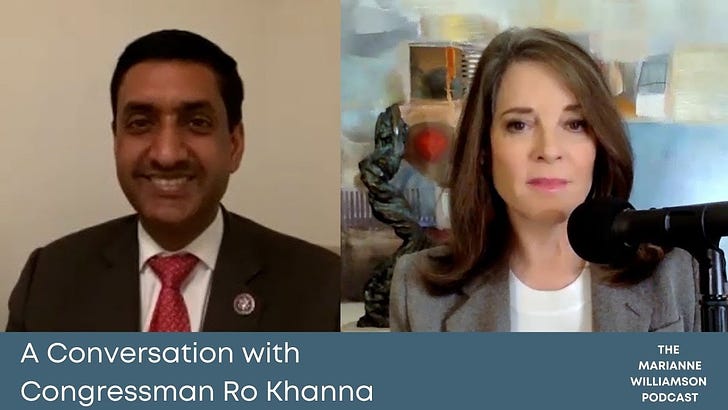


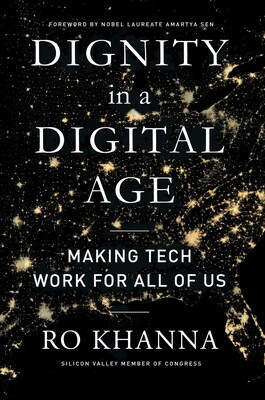
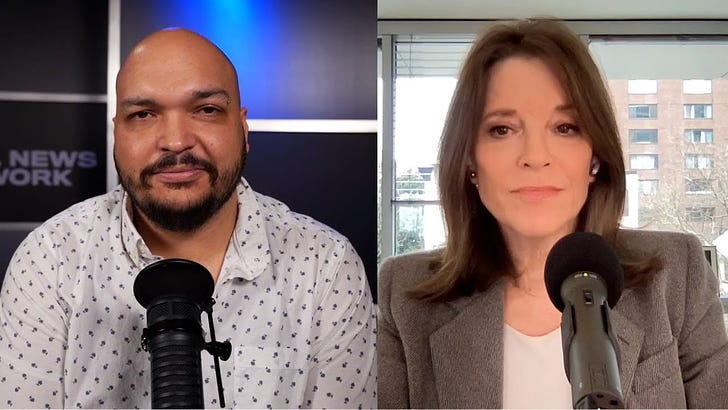

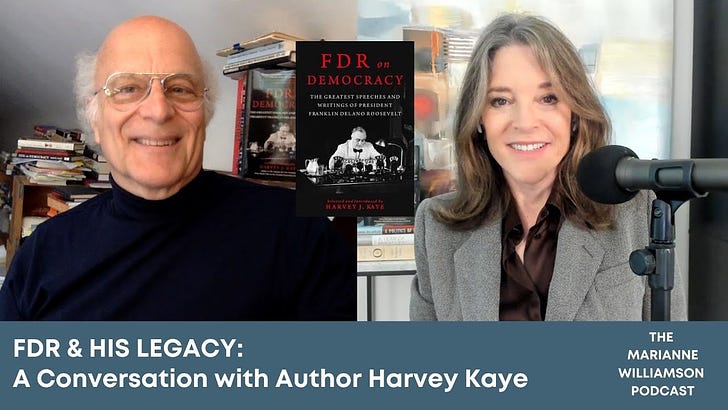
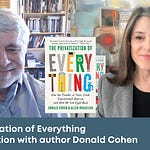
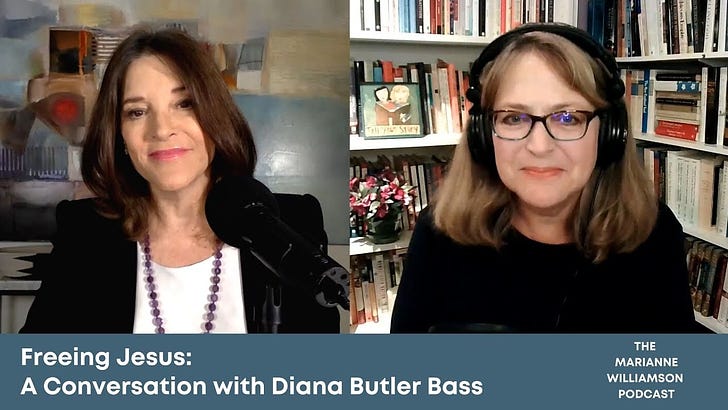

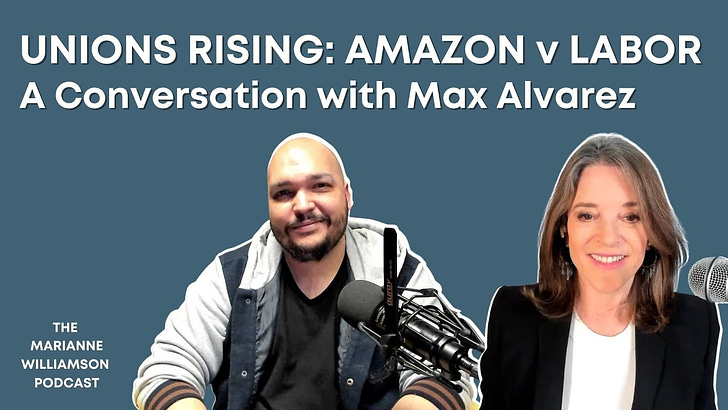

On Dignity and the Digital World